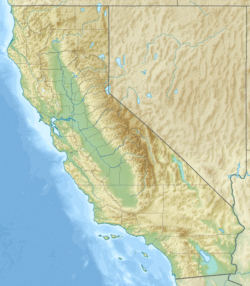Cottonwood Creek (San Diego County) facts for kids
Quick facts for kids Cottonwood Creek |
|
|---|---|
|
Location of Cottonwood Creek in California
|
|
| Country | United States |
| State | California |
| Physical characteristics | |
| Main source | Laguna Mountains Cleveland National Forest 5,406 ft (1,648 m) 32°49′56″N 116°27′57″W / 32.83222°N 116.46583°W |
| River mouth | Rio Alamar About 15 mi (24 km) east of Tijuana 558 ft (170 m) 32°34′02″N 116°45′55″W / 32.56722°N 116.76528°W |
| Length | 36 mi (58 km) |
| Basin features | |
| Basin size | 310 sq mi (800 km2) |
Cottonwood Creek is a stream about 36 miles (58 km) long in southern San Diego County, California. It is an important part of the Tijuana River system. This creek helps collect water in the area.
Contents
Where Does Cottonwood Creek Start?
Cottonwood Creek begins high up in the Laguna Mountains. This area is part of the Cleveland National Forest, near a place called Pine Valley. The water flows from these mountains, starting its long journey.
The Creek's Journey
The creek first flows south through a flat area known as the Cottonwood Valley. Here, its water collects in Lake Morena. This lake is created by the Morena Dam.
Flowing Through Dams
After Lake Morena, the creek turns west. It then flows through a narrow valley to another lake called Barrett Lake. This lake is formed by the Barrett Dam. Both Morena and Barrett Dams are important for managing water.
Joining Other Streams
From Barrett Lake, Cottonwood Creek turns south. It passes by Barrett Junction. Finally, it meets Tecate Creek to form a new stream called the Rio Alamar. This meeting point is very close to the United States–Mexico border. Most of Tecate Creek and the Rio Alamar are located in Mexico.
Why is Cottonwood Creek Important?
The water from Cottonwood Creek is a small part of the water supply for the city of San Diego. The lakes it flows into, Lake Morena and Barrett Lake, are reservoirs. These reservoirs store water for people to use.
San Diego's Water Supply
Water from Cottonwood Creek can travel through a pipe called the Dulzura Conduit. This pipe carries water to another reservoir, Lower Otay Reservoir. Even though Cottonwood Creek helps, San Diego mostly gets its water from the distant Colorado River.
 | Sharif Bey |
 | Hale Woodruff |
 | Richmond Barthé |
 | Purvis Young |


